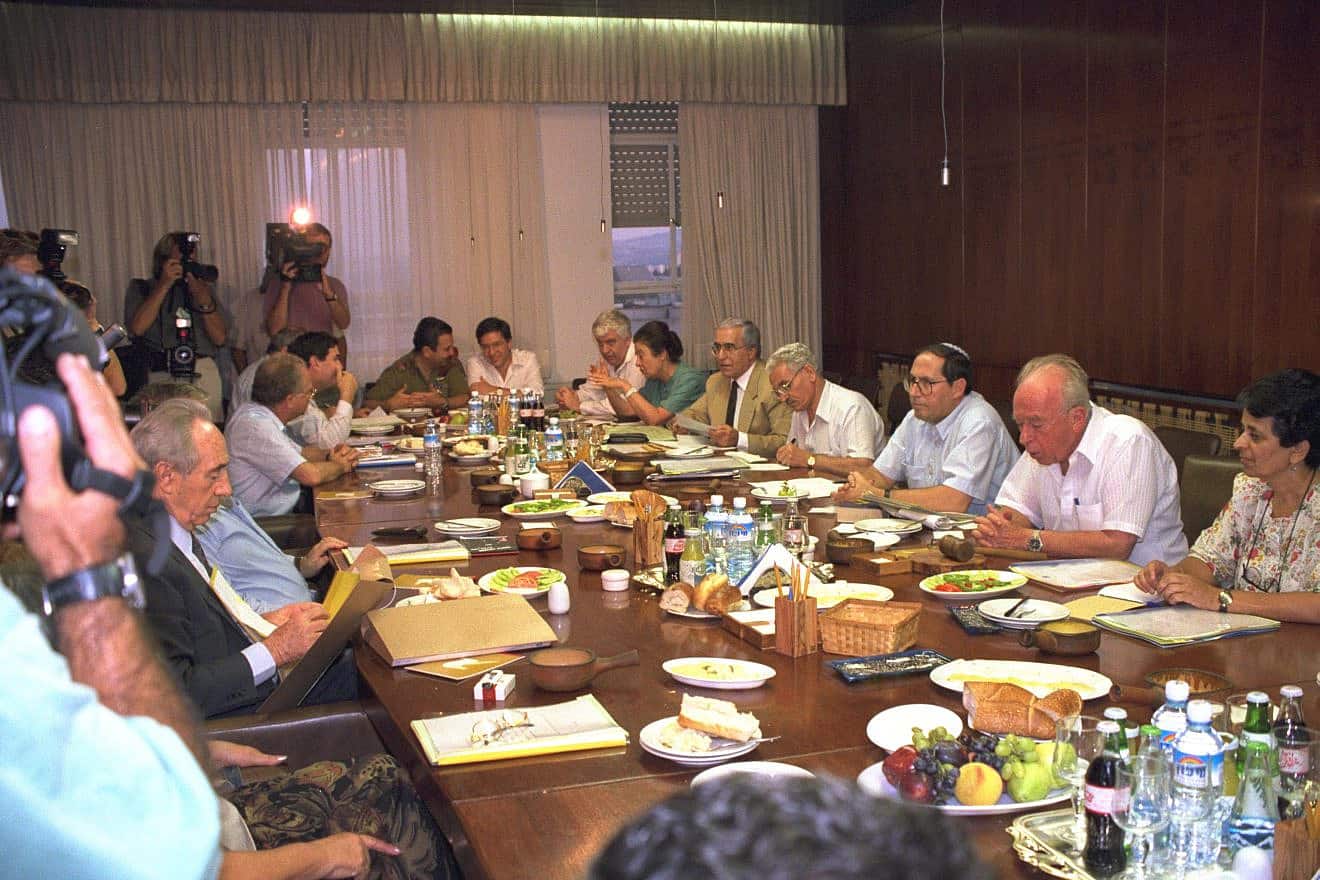Thirty years ago on Aug. 30, 1993, the Israeli government approved the Oslo I Accord. The minutes of the meeting remained “top secret” until Tuesday when the State Archives released them to the public.
What emerges from the minutes are concerns from the government ministers, including Prime Minister Yitzhak Rabin, about the path they are about to embark on.
The Oslo Accords were an attempt to bring peace between Israeli and Palestinian Arabs by handing over areas under Israeli control to Palestine Liberation Organization Chairman Yasser Arafat (starting with parts of the Jericho region and the Gaza Strip), and investing him with legitimacy.
Arafat had until then been known as the father of modern terrorism, and opponents of the accords warned he would not change his stripes. Their alarms proved prescient as Arafat would unleash an unprecedented wave of terrorism on Israeli civilians, in which thousands of Jews lost their lives.
While Rabin would reject the warnings of Oslo’s detractors and defend the accords publicly, privately he admitted his fears at the meeting, which was attended by another 17 government members and then-IDF Chief of Staff Ehud Barak.
“This is a difficult deal,” said Rabin at the outset, according to the minutes. “Of course, had we been negotiating with ourselves, the wording would have been far better. Some of the phrasing is unsympathetic … but we must regard all of the different components from a much more comprehensive view.”

Rabin also noted that there was little demanded of the other side. “There is very little commitment on their part,” he said.
Rabin said Foreign Minister Shimon Peres told him that there would be a statement by the Palestinians about stopping terrorism. Though he then admitted, “I do not know how it is formulated and to what extent it is part of the deal.”
Peres interjected, “Cessation of violent actions.”
“I hope this is a condition and we need to see what the statement is. Is it a text? Who is declaring this? Does it also appear in writing? As an appendix? This is not airtight,” Rabin said.
Peres, who spoke next and would paint a messianic-like future for the region in his 1993 book The New Middle East, warned at the meeting that “there is a possibility that the whole PLO business will fall apart and there will be a kind of Hamas-Iran here.”
Both Rabin and Peres took the line that the government had few options if it wanted to pursue a resolution to the conflict. Rabin said a deal involving the Syrians and negotiations involving the Americans had much chance of success.
Peres said there weren’t other partners on the other side. “Suppose the PLO disappears, what will happen then? Whom will we talk to? About what will we negotiate? Whom will we negotiate with.”
Barak, who would later offer far-reaching concessions to Arafat as prime minister, said, “I’ve detected very serious problems with implementing the security aspect of this agreement.
“There are already Palestinian police officers who were trained in Jordan. They could bring more people, including people with a background in military or paramilitary Palestinian organizations, people from the Palestine Liberation Army or similar things,” he said.
Barak wondered whether the IDF could coordinate with Palestinian police to extract wanted people or to foil a terrorist attack in Palestinian-controlled areas.
“When we have information about wanted people in Jabaliya or a terrorist attack being planned in one of the refugee camps, it won’t be simple to effectively act against it. There is always the danger that field operatives for the Palestinian police will tip off … those planning a terrorist attack,” he said.
Then-Interior Minister Aryeh Deri, representing Shas, a religious party, said that while his party’s spiritual leader, Rabbi Ovadia Yosef, felt strongly about peace, Shas voters were “quite right-wing,” and places like Nablus (Shechem) and Hebron (both later to be transferred to Palestinian control) were important to them. “It is very difficult for the public to accept this.”
Despite the government’s reservations, 16 voted in favor of approving the Oslo Accords with two abstentions: Deri and Minister of Economics and Planning Shimon Shetreet of the Labor Party.
Two weeks later, on Sept. 13, 1993, Rabin and Arafat signed the Oslo Accords on the White House Lawn in the presence of U.S. President Bill Clinton.
Parts of the protocol still remain classified. Part will be published in the next 20 years and the rest in 60 years.


























